
www.newsbusters.org
OUCH: Leavitt Throws Down With CNN Hack Kaitlan Collins Over VILE Iran Question
Late in what was otherwise a surprisingly respectful White House press briefing on Wednesday afternoon, former conservative reporter-turned-CNN liberal Kaitlan Collins disgustingly claimed to Press Secretary Karoline Leavitt that Secretary of War Pete Hegseth’s comments hours earlier about the press fixating negative stories about the Iran mean the administration doesn’t want the media to cover the upcoming dignified transfer for six American heroes lost thus far in the war.
Collins — with her inability to show little emotion besides robotic annoyance — huffed: “You just mentioned the President is going to attend the dignified transfer for these families. Given what Secretary Hegseth said this morning, is it the position of this administration that the press should not prominently cover the deaths of U.S. service members?”
Shocked as anyone would be, Leavitt made the obvious distinction between honoring the fallen and the reality that the administration believes “the press in this room and the press across the country should accurately report on the success of Operation Epic Fury and the damage it is doing to the rogue Iranian regime that has threatened the lives of every single American in this room.”
WATCH: @PressSec @KarolineLeavitt absolutely destroys a disgusting series of gotcha questions from former conservative reporter-turned-CNN liberal, @KaitlanCollins...
Collins: “You just mentioned the President is going to attend the dignified transfer for these families. Given… pic.twitter.com/QJjFwITZhg
— Curtis Houck (@CurtisHouck) March 4, 2026
Collins continued to be purposefully dense: “But Secretary Hegseth was complaining that it was front page news about these six service members who were killed.”
Leavitt stated another obvious point that this was “not what the secretary said” or “meant and you know it.”
“You know, you’re being disingenuous,” she added and tried to continue with the claim America’s “never had a secretary of defense who cares more” about the soldiers than Hegseth, but Collins wouldn’t let her finish and read the quote aloud.
“He said, ‘when a few drones get through or tragic things happen, it’s front page news. I get it. The press only wants to make the President look bad.’ As you know, we cover the deaths of U.S. service members under every president,” Collins groused.
Leavitt then dropped the hammer on the CNN tool by telling her “[t]he press does only want to make the President look bad” and “especially you and especially CNN” (click “expand”):
LEAVITT: The press does only want to make the President look bad. That’s a — that’s a fact — especially you. No, listen to me, especially you and especially CNN and the secretary of defense cares deeply about our warfighters and our men and women in uniform. He travels all across this country to meet with them, to connect with them, and your network has hardly ever probably reported on that. You also had the chairman of the Joint Chiefs, Chairman Caine, who’s a brave patriot standing alongside the secretary at the Pentagon this morning, again expressing his condolences to these families. And I just told you that the President of the United States will be attending their dignified transfer.
COLLINS: But we’re going to cover that dignified transfer.
LEAVITT: So please, so please —
COLLINS: That’s not making the President look bad. That’s showcasing that.
LEAVITT: — so — and we — we expect you to cover that as you should.
COLLINS: And we did it in his first term and under Biden.
LEAVITT: We expect you to cover that as you should, Kaitlan. But you and your network know that you take every single thing this administration says and tries to use it to make the President look bad. That is an objective fact.
COLLINS: I don’t think covering troop deaths is trying to make the President look bad.
LEAVITT: If you’re trying to — if you’re trying to argue right now that CNN’s overwhelming coverage is not negative of President Donald Trump, I think the American people would tend to agree —
COLLINS: I don’t think covering troop deaths is [inaudible].
LEAVITT: — and your ratings would tend to disagree with that as well[.]
In reality, Hegseth was making an allusion to the doom porn the press have been trigger happy to deploy in the early days of the war (such as here from Tuesday night on ABC).
A few minutes prior to Collins, The Independent’s Andrew Feinberg took issue with Leavitt becoming the latest member of the administration to walk through the last 47 years of bloody U.S.-Iranian relations as mere “grievances” and not provide, in his mind, a single “imminent threat” Iran posed to the United States for justifying the war.
Leavitt ripped this line of attack, saying “I completely reject the premise of your question” (click “expand”):
.@Independent’s @AndrewFeinberg: “At the top of the briefing, you listed a long list of grievances against the Iranian government, going back to the takeover of the embassy in 79, barracks bombing in the 80s, etc. But no one from the administration has laid out the imminent… pic.twitter.com/WElM6CzBK6
— Curtis Houck (@CurtisHouck) March 4, 2026
I completely reject the premise of your question. You have had the President of the United States, the Secretary of War, the chairman of the Joint Chiefs, the Vice President of the United States, the Secretary of State. And now, I am out here today to explain to you exactly what led the President to make the decision to launch Operation Epic Fury, and President Trump does not make these decisions in a vacuum. This decision to launch this operation was based on a cumulative effect of various direct threats that Iran posed to the United States of America, and the President's feeling, based on fact, that Iran does pose an imminent and direct threat to the United States of America, based on the fact that they are the world's leading state sponsor of terrorism, based on the fact that they were rapidly and aggressively building up their ballistic missile program to give themselves immunity within their country alongside their navy, so that inside their country they could continue to create nuclear weapons and nuclear bombs, which would, of course, pose a risk to Americans in the region. And even Americans one day here at home. And then another point on this is the president found that through these extensive, exhaustive failed negotiations with Iran, that they were hell bent on death and destruction.
So, again, the President was not going to be just another president on a very long list who sat back and stood by and passed the buck of this direct threat to the next administration. The President had a feeling, again, based on fact, that Iran was going to strike. The United States, was going to strike our assets in the region, and he made a determination to launch Operation Epic Fury based on all of those reasons, and I would like the media to actually report on all of them, rather than just picking soundbites from one person in this administration and saying, oh, they're contradicting the other person. No. Again, these decisions are not made in a vacuum. They are made by the President's feeling that Iran was going to strike the United States and our assets in the region, and he was not going to sit back and watch that happen. The determination was made that the president was going to strike first alongside Israel and that has obviously been proven to be the right decision and an effective one at that.
Rewinding to the beginning, the “new media seat” recipient was TBN’s Erick Stakelbeck and then NBC’s Garrett Haake leveled a challenging but substantive question (i.e. the kind Collins and the CNN trolls should try more often:
NBC’s @GarrettHaake: “Axios, I think, was the first to report this morning, this phone call between the President and Prime Minister Netanyahu saying that Netanyahu had given us this information about where the ayatollah would be and that he'd be with these deputies on Saturday.… pic.twitter.com/5uctCPtXrZ
— Curtis Houck (@CurtisHouck) March 4, 2026
Fox’s Jacqui Heinrich came up after a Haake follow-up and she focused on the Americans stranded in the Middle East and the impact the war has on gas prices:
JACQUI TIME: “Obviously, seeing the update from the State Department on the 17,500 Americans that have already come back, including some 8,000 just yesterday, there are still 6,000 that are looking to get out, as I understand it. And just in the context of what you just told… pic.twitter.com/Xz6bgS6OYA
— Curtis Houck (@CurtisHouck) March 4, 2026
Fox’s @JacquiHeinrich: “And then one follow up just on how people might be experiencing this at home with respect to the economy and the cost of oil spiking, is there a need to start those Navy escorts in the Strait of Hormuz now to sort of blunt the impact to people, and also… pic.twitter.com/SwfOWOGqlt
— Curtis Houck (@CurtisHouck) March 4, 2026
CBS’s Nancy Cordes tried to trap Leavitt on this liberal narrative that Trump has unnecessarily stranded Americans a la Joe Biden in Afghanistan.
Of course, Leavitt repeatedly explained there had been repeated warnings (along with what she told Heinrich in the second video above):
CBS’s @NancyCordes: “The President said yesterday there wasn't time to make evacuation plans because this all happened so quickly, given how critical the President has been of the chaotic evacuation from Afghanistan by the last administration five years ago, why wasn't there more… pic.twitter.com/NIgjxEJBkE
— Curtis Houck (@CurtisHouck) March 4, 2026
CBS’s @NancyCordes: “But Americans who called the State Department hotline as recently as last night were being told, we can't help you. You have to make your own plans.”@PressSec @KarolineLeavitt: “Well, the line was updated, and I expect every single person in this room to… pic.twitter.com/ntOnqS10Zp
— Curtis Houck (@CurtisHouck) March 4, 2026
CBS’s @NancyCordes: “Do you have any details on how many charter flights have been able to get out of the region so far with Americans on board?@PressSec @KarolineLeavitt: “I don't have an exact count for you, but I know that we're working on chartering many flights as soon as… pic.twitter.com/4Mnz0QWwyA
— Curtis Houck (@CurtisHouck) March 4, 2026
Skipping ahead, New York Times reporter Shawn McCreesh asked whether “the United States airstrike a girls elementary school in kill 175 people”:
.@NYTimes’s @ShawnMcCreesh: “Did the United States airstrike a girls elementary school in kill 175 people?”@PressSec @KarolineLeavitt: “Not that we know of, Sean. And the Department of War is investigating this matter. And I would just tell you very strongly, the United States… pic.twitter.com/UVkU6u5kOW
— Curtis Houck (@CurtisHouck) March 4, 2026
On an important, non-Iran-related topic, our friend Reagan Reese of the Daily Caller brought up the SAVE Act:
.@DailyCaller’s @ReaganReese_: “Prior to the Iran conflict, the SAVE Act was really the focus of the news cycle. Is the SAVE Act still a priority for the administration?”@PressSec @KarolineLeavitt: “Absolutely.”
Reese: “Will you just provide an update on the administration's… pic.twitter.com/tzEbsODfeF
— Curtis Houck (@CurtisHouck) March 4, 2026
Remarkably, there was only one question about the U.S. military operations Tuesday in Ecuador and it came in the last question of the entire briefing from Washington Examiner’s Christian Datoc:
.@DCExaminer’s @TocRadio: “First, what can you tell us about the military operation in Ecuador? And then secondly, is the President considering invoking the Defense Production Act to boost munitions stockpiles while we are in this conflict?”@PressSec @KarolineLeavitt: “It’s not… pic.twitter.com/JChS37Kotg
— Curtis Houck (@CurtisHouck) March 4, 2026
To see the relevant transcript from the March 4 briefing (including even more questions), click here.

